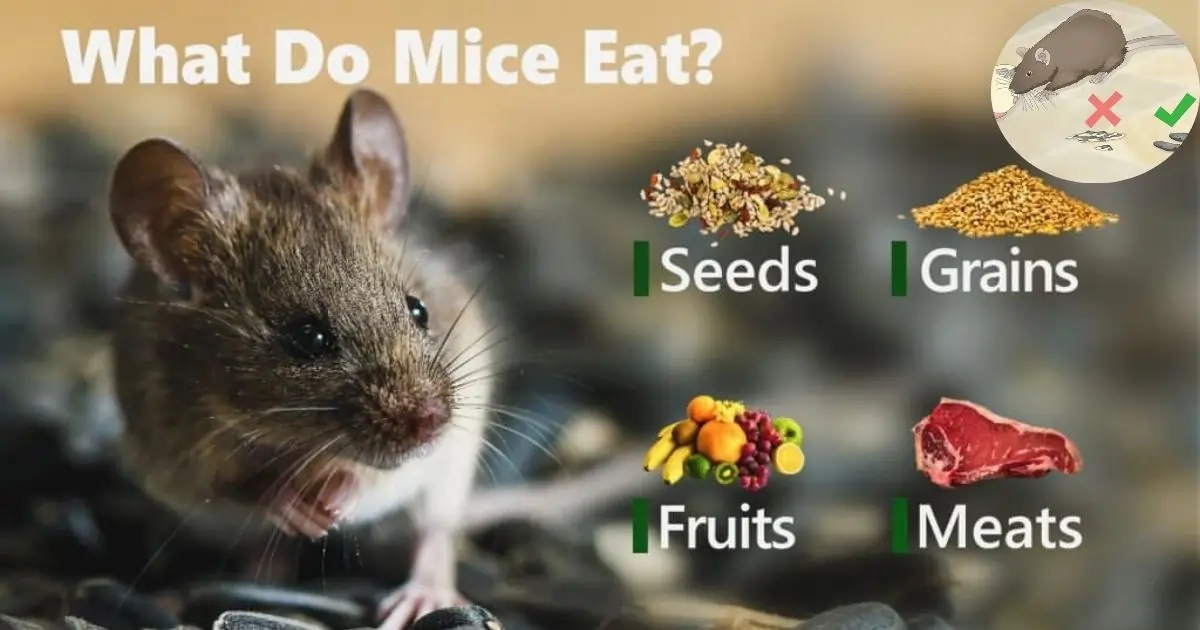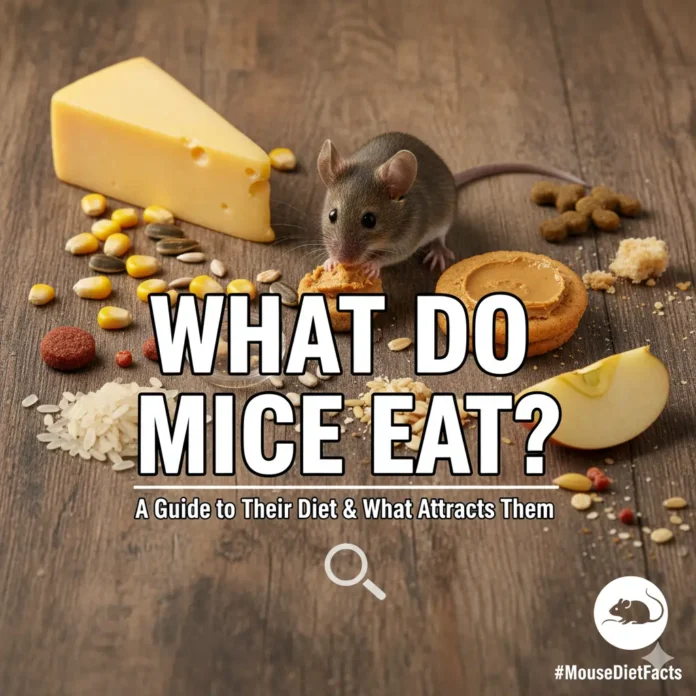Introduction: Understanding What Do Mice Eat
When you think of a mouse, the first image that probably comes to mind is a small creature nibbling on cheese. While that’s a popular stereotype, the truth about what mice eat is far more fascinating. Mice are omnivorous, meaning they consume a wide variety of foods depending on their environment, availability, and instinctive needs.
Whether you’re a pet owner, a researcher, or simply curious about these tiny mammals, understanding their dietary habits helps in caring for them or managing infestations humanely. In this article, we’ll explore what mice eat in the wild, at home, and in captivity, along with practical tips on what to feed (and what not to feed) pet mice.
Top 7 Things Mice Love to Eat
If you’ve ever wondered what foods mice simply can’t resist, here’s a list of the top seven things they love most — whether they’re wild, house, or pet mice. Understanding these favorites can help pet owners feed their mice better and help homeowners prevent unwanted visits.

1. Seeds and Grains
These are absolute favorites. Seeds (like sunflower and pumpkin) and grains (like oats, rice, and wheat) give mice the energy they need to stay active. They also love to hoard them for later use — a natural survival instinct.
2. Fruits and Berries
Mice adore sweet, juicy foods. Apples, bananas, and berries are irresistible because of their natural sugars. They also provide vitamins and hydration.
3. Nuts and Peanut Butter
Nuts are rich in fat and protein — two nutrients mice need for warmth and energy. Peanut butter, although sticky, is one of the strongest attractants due to its scent and taste (just be cautious with pets — a tiny dab goes a long way).
4. Vegetables
Fresh veggies like carrots, peas, broccoli, and corn are top choices. They give mice fiber and hydration, promoting better digestion and overall health.
5. Whole Grains and Bread Crumbs
Mice love the texture and mild sweetness of bread, especially whole-grain types. Bread crumbs scattered around can quickly attract them indoors.
6. Sweet Snacks and Cereal
Sugar attracts mice just as it does humans! Mice enjoy sugary cereals, biscuits, and crumbs of baked goods. However, these should never be a staple diet for pet mice — just an occasional treat.
7. Insects and Protein Bits
When plant food is scarce, mice turn to insects like beetles or larvae. For pet mice, small bits of boiled egg or mealworms can mimic this natural protein source safely.
Quick Summary Table
| Rank | Favorite Food of Mice | Why They Love It | Type (Wild/House/Pet) |
| 1 | Seeds & Grains | Energy-rich and easy to store | All |
| 2 | Fruits & Berries | Sweet taste and hydration | All |
| 3 | Nuts & Peanut Butter | High protein and fat | House & Pet |
| 4 | Vegetables | Fiber and hydration | Pet & Wild |
| 5 | Whole-Grain Bread | Mild sweetness, soft texture | House |
| 6 | Sweet Snacks & Cereal | Sugary and easy to chew | House |
| 7 | Insects & Protein Bits | Protein boost for survival | Wild & Pet |
💡 Expert Tip: If you’re trying to attract pet mice to eat new foods, mix small bits of their favorites (like grains or fruits) with healthier pellets. For homeowners dealing with wild mice, avoiding these foods near open spaces or trash bins can help keep them away.
What Do Mice Eat in the Wild?
In their natural habitats, wild mice have incredibly adaptable diets. They’re opportunistic feeders, which means they’ll eat whatever they can find to survive.
Common Wild Mouse Foods Include:
- Seeds and grains – Mice love seeds and grains, which provide them with essential carbohydrates and energy.
- Fruits and vegetables – They often eat fallen fruits, berries, and even soft plant stems.
- Insects – Wild mice occasionally eat insects for protein, especially during food shortages.
- Roots and leaves – As scavengers, they’ll nibble on plants or roots when other food sources are scarce.
Wild mice are also excellent foragers. They spend a large portion of their night searching for food and storing it for later use.
👉 Interesting fact: Wild mice can survive on very little water because most of their hydration comes from the food they eat, such as fruits and fresh plants.
What Do Mice Eat in Your House?
House mice (Mus musculus) are the most common type you’ll encounter indoors. Their diet largely depends on human leftovers and pantry access.
Foods Commonly Eaten by House Mice:
- Grains and cereals – Oats, rice, pasta, and bread crumbs are favorites.
- Nuts and seeds – Mice are drawn to peanut butter, sunflower seeds, and similar snacks.
- Sweets and baked goods – They have a surprisingly strong sweet tooth and will nibble on cookies or candy.
- Pet food – Dog and cat kibble are easy meals for mice.
- Food scraps and garbage – Mice can survive on very little and will scavenge from trash bins.
💡 Homeowners’ Tip: To prevent mice infestations, store food in airtight containers and clean up crumbs regularly. Even tiny traces of food can attract them overnight.
Do Mice Really Eat Cheese?
The classic cartoon image of a mouse loving cheese is more myth than fact. While mice can eat cheese, it’s not their first choice.
Here’s Why:
- Many cheeses have a strong smell that mice actually dislike.
- They prefer foods that are sweeter and grain-based rather than fermented dairy.
- Hard cheeses like cheddar may be eaten if no other options are available, but it’s not a preferred food source.
✅ Conclusion: Cheese isn’t toxic for mice, but it’s far from their top pick. Think of it as a “last resort” food.
What Do Pet Mice Eat?
If you have pet mice, a balanced and nutritious diet is essential for their health and lifespan.
Recommended Foods for Pet Mice:
- Commercial mouse food – High-quality pellets provide all necessary nutrients.
- Fresh fruits and vegetables – Apples, bananas, carrots, peas, and broccoli are great options.
- Protein sources – Small bits of cooked egg or mealworms can support muscle growth.
- Whole grains – Brown rice, oats, and whole-grain bread offer energy and fiber.
Foods to Avoid:
- Chocolate (toxic to mice)
- Caffeine and alcohol
- Sticky foods like peanut butter in large amounts (can choke them)
- Processed junk food
💬 Expert Tip: Feed pet mice twice daily and provide constant access to clean water. A varied diet ensures better health and more active behavior.
What Do Baby Mice Eat?
Baby mice (pups) have different nutritional needs than adults. For the first few weeks, they rely entirely on their mother’s milk.
Growth Stages and Diet:
- 0–3 weeks: Mother’s milk only
- 3–4 weeks: Gradual introduction of soft solid foods (oats, mashed fruits)
- 4 weeks and beyond: Transition to a full adult mouse diet
If you’re hand-raising baby mice (e.g., orphaned ones), feed them a milk replacement formula using a small dropper until they are weaned.
What Do Field Mice Eat?
Field mice live outdoors and have a diet that reflects their natural environment.
Common Field Mouse Foods:
- Wild grains and seeds
- Berries and nuts
- Grass and leaves
- Insects and larvae
During autumn, field mice collect and store food in underground burrows for the winter. This behavior helps them survive harsh weather when fresh food is scarce.
Example: In rural areas, field mice may invade barns or sheds to find stored grains, which are easy pickings during the cold months.
Seasonal Eating Habits of Mice
Mice adapt their diet with the seasons:
- Spring: Fresh plants, seeds, and insects
- Summer: Berries, fruits, and grains
- Autumn: Nuts and roots (storage period)
- Winter: Stored foods and scavenging indoors
This seasonal behavior is an evolutionary trait that allows them to survive year-round, regardless of food availability.
What Should You Not Feed Mice?
Just because mice can eat almost anything doesn’t mean everything is safe. Some foods can be harmful or even deadly.
Dangerous Foods for Mice:
- Chocolate and caffeine
- Sugary or salty snacks
- Raw potatoes and onions
- Citrus fruits (can cause stomach upset)
- Alcohol or carbonated drinks
Always research before introducing new foods to pet mice, especially fruits and human snacks.
Do Mice Eat Each Other? (Cannibalism Explained)
Though rare, mice may eat each other in extreme situations — particularly in overcrowded cages or food scarcity. This behavior is linked more to stress and survival instincts than diet.
To prevent this in pet mice:
- Ensure enough food is available.
- Avoid overcrowding cages.
- Provide enrichment toys and nesting material.
How Much Do Mice Eat a Day?
Mice eat small amounts frequently — about 3 to 5 grams of food daily. They prefer to nibble multiple times rather than eat one large meal.
They’re most active at night, so you’ll often find them foraging or feeding in the dark.
How to Create a Balanced Diet Plan for Pet Mice
A well-rounded diet keeps your mouse healthy, energetic, and happy.
Example Meal Plan:
- Morning: Small serving of mouse pellets
- Evening: Fresh fruit and vegetable mix
- Weekly Treats: A tiny piece of boiled egg or a sunflower seed
Always monitor their weight and behavior to ensure they’re eating well and not showing signs of malnutrition or obesity.
Conclusion: The Real Diet of Mice
So, what do mice eat? The short answer — almost anything they can find. But the best diet depends on their type (wild, house, or pet), age, and environment.
Mice thrive on a varied diet of grains, seeds, vegetables, and proteins. While they can survive on scraps, a balanced diet supports their growth, energy, and overall health.
Understanding their dietary habits helps us care for pet mice better — and control wild populations more effectively.
FAQs About What Do Mice Eat
- Do mice eat meat?
Yes, occasionally. Mice may eat insects or small bits of meat when plant-based food is scarce. - Can mice drink milk?
Adult mice are lactose intolerant. Avoid giving them milk or dairy products. - What’s a mouse’s favorite food?
Grains, seeds, and sweet foods like fruit or cereal. - Can mice eat rice?
Yes, both cooked and uncooked rice are safe for mice. - What food attracts mice the most?
Peanut butter, chocolate, and grains are top attractants. - Do mice eat bread?
Yes, mice enjoy bread, especially whole-grain types. - How long can mice survive without food?
They can survive 2–4 days without food but need constant access to water. - What do mice eat in winter?
Store grains, nuts, and household food scraps indoors. - Can mice eat vegetables daily?
Yes, but rotate different vegetables to prevent digestive issues. - Are mice omnivores or herbivores?
Mice are omnivores — they eat both plant-based and animal-based foods.
Read Also:

